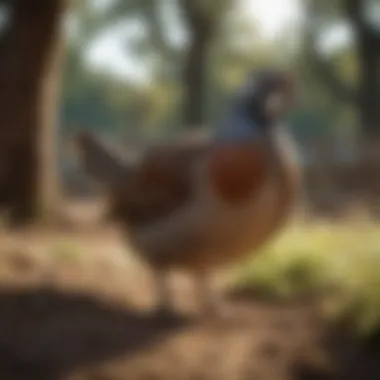Where to Buy Live Quail: Your Complete Buying Guide


Intro
Quail ownership is an increasingly popular aspect of pet care and small-scale farming. This comprehensive discussion is aimed at those looking to buy live quail, highlighting various purchasing sources and giving guidance on the responsible care of these birds. The sourcing of quail carries significance, as it ensures both ethical treatment and promotes the health of the birds, thus enhancing the overall joy of pet ownership.
As we delve into the various options for purchasing live quail, we will also touch upon the relevant factors, such as the types of suppliers, regional market variations, and aftercare considerations. It is critical for prospective quail owners to have all the necessary information at their disposal to not only secure their birds but also to foster a healthy environment for them.
Understanding Suppliers
When it comes to sourcing live quail, the choice of supplier is perhaps one of the most essential factors.
Types of Suppliers
- Local Farms: Many local farms specialize in raising quail for sale. They often offer a range of breeds and sizes. Purchasing directly from these places presents an opportunity to observe the birds' conditions and get firsthand information from the breeders.
- Online Retailers: Websites like Cackle Hatchery and Meyer Hatchery provide a wide selection of quail breeds available for delivery. This option allows buyers to access diverse types of quail that they may not find locally.
- Pet Stores: Some pet stores have live quail available. The range may be limited, but it is a convenient option, particularly for those new to keeping quail.
- Specialty Breeders: These individuals often focus on specific breeds and provide detailed information about their rearing practices. Engaging with a breeder can also lead to a more personalized buying experience.
Consider sourcing quail from ethical breeders to ensure the health and wellbeing of the birds.
Regional Considerations
The ability to purchase live quail can vary significantly depending on your geographic location. It's vital to be aware of local regulations regarding bird ownership. Different areas may have restrictions that could affect your ability to raise quail.
- Check Local Laws: Some regions may have zoning laws or specific regulations pertaining to the keeping of birds. This might limit the number of quail you can have or require permits.
- Climate Suitability: Understanding your local climate is crucial for quail health. Some breeds may thrive in warmer weather, while others are more resilient in colder conditions. This knowledge can help you choose the right breed for your environment.
Ensuring a Successful Purchase
Once you have identified where to buy quail, there are steps to follow for a successful transaction.
- Inspection: Always inspect the health of quail before finalizing your purchase. Look for signs of illness, like lethargy or abnormal feathering.
- Documentation: Ensure that any necessary paperwork is in order, especially when purchasing from a breeder. It is important for both tracking and legal purposes.
- Ask Questions: Communicate with the seller. Ask about the quail's feed, age, and any health issues they may have encountered.
In summary, buying live quail requires careful consideration of various factors, including the choice of supplier, regional laws, and the health of the birds. As you prepare to embark on this journey, equip yourself with knowledge to ensure a successful and fulfilling experience. In the next sections, we will delve deeper into the specifics of quail care and management to enhance your understanding and capability as a quail owner.
Understanding the Quail Market
Understanding the quail market is crucial for anyone interested in acquiring live quail. This section provides a comprehensive overview of various aspects that inform potential buyers about the dynamics of quail availability, species diversity, and market trends. Factors such as the purpose of keeping quail, whether for pets, meat, or egg production, play a significant role in shaping the purchase decision.
In recent years, more people have shown interest in raising quail. This has led to an increase in suppliers and options available to consumers. Knowledge of the quail market not only aids in making informed decisions but also ensures responsible sourcing from suppliers committed to animal welfare. The importance of understanding this market cannot be overstated, as it significantly affects the quality of the birds you will eventually buy and their overall health.
Overview of Quail Species
There are several species of quail available, each with its unique characteristics. The most common species include Coturnix quail, Bobwhite quail, and California quail. Coturnix quail are particularly favored for their rapid growth and high egg production rates. They are often kept for both meat and eggs. Bobwhite quail, on the other hand, are popular in the hunting community and are appreciated for their robust flavor.
Here's a brief overview of some notable quail species:
- Coturnix Quail: Known for fast maturity; common for personal and commercial egg production.
- Bobwhite Quail: Valued for game purposes; thrives in more natural settings.
- California Quail: Recognizable by its distinctive markings; popular as pets.
Understanding these species helps buyers match their needs with appropriate birds. Each type has specific care requirements, which should also be taken into account when deciding.
Purpose of Keeping Quail
People choose to keep quail for various reasons. The primary purposes include:
- Egg Production: Quail eggs are sought after for their taste and nutritional value, often considered gourmet items.
- Meat Source: Quail meat is tender, lean, and rich in flavor. It is increasingly popular in restaurants and gourmet cooking.
- Pets and Companionship: Many keep quail for their distinct appearances and behaviors. They can be engaging and charming as pets.
Keeping the purpose in mind can greatly influence the type of quail you choose to purchase. Prospective buyers should assess their goals and resources beforehand to ensure a suitable match.
Understanding why you want to keep quail will help direct your purchasing decisions and ensure the best experience.
Types of Quail Available for Purchase
Understanding the types of quail one can purchase is crucial for potential quail enthusiasts. Each species of quail has unique characteristics, housing needs, and purposes, which can greatly influence the buyer’s choice. This section delves into the main types of quail available, providing insights into their behaviors, benefits, and considerations.
Coturnix Quail


Coturnix quail, also known as Japanese quail, are among the most popular types kept by hobbyists and farmers alike. They are small, weighing between 5 to 10 ounces. Their rapid growth allows them to be raised for meat and eggs, typically reaching maturity in about six weeks.
Benefits of Coturnix quail include:
- High egg production: They can lay up to 300 eggs per year.
- Adaptable nature: These quail do well in various environments, both indoors and outdoors.
- Small space requirement: They need less space than larger poultry, making them suitable for backyard farming.
However, potential buyers should consider the social nature of Coturnix quail. They thrive in groups, so acquiring more than one is advisable to ensure their well-being.
Bobwhite Quail
Bobwhite quail are another favored choice, often recognized for their striking, well-defined calls and hardy demeanor. These quail are slightly larger than Coturnix quail and are primarily raised for game and sport hunting. They can weigh from 5 to 6 ounces and typically require more space than Coturnix.
Key points about Bobwhite quail include:
- Stronger flight instinct: They are good flyers and require a more extensive enclosure.
- Coloration: They exhibit diverse color variations, which can be aesthetically pleasing for breeders.
- Social structure: Bobwhites often form strong bonds; hence, it's better to keep them in pairs or small groups.
When considering Bobwhite quail, it's essential to provide an environment that mimics their natural habitat, as this will support their health and behavioral needs.
Other Species
Besides Coturnix and Bobwhite, there are various other quail species available for purchase. Some notable mentions include:
- California quail: Known for their distinctive plumed head, these quail are more often kept for ornamental purposes.
- Gambel's quail: Found in desert regions, they require specific climates to thrive.
When exploring alternative species, consider factors like habitat compatibility, climate, and intended use, such as egg production or decoration.
"Choosing the right type of quail is essential not only for your enjoyment but also for their health and wellbeing. Each species has its own set of needs and characteristics that can impact your raising experience."
This insight into the types of quail will help prospective buyers make informed decisions based on their needs, preferences, and environmental considerations.
Where to Buy Live Quail
In the realm of raising quail, acquiring the birds from reliable sources is paramount. The quail market is intricate, and knowing where to buy live quail is essential for pet owners and enthusiasts. This section discusses the various suppliers available and offers insights into each option. This knowledge helps ensure a positive purchasing experience, which is crucial for the health and well-being of the birds.
Local Farms and Hatcheries
Local farms and hatcheries are often the first stop for those looking to buy live quail. These establishments are advantageous because they provide a direct source of birds. Customers can observe the living conditions of the quail, thereby ensuring they come from a healthy environment. Farms usually have a variety of quail species available, allowing buyers to choose based on their specific needs.
Visiting a local farm can give buyers access to fresh, well-cared-for birds. Additionally, interactions with farm owners can be beneficial. Buyers can ask questions regarding the birds’ diet, habitat, and social habits. Many farms also offer guidance on best practices for raising quail, making them a valuable resource.
Online Suppliers
Online suppliers have become a popular choice for purchasing live quail. They offer the convenience of browsing various breeds from the comfort of one’s home. Suppliers such as MyPetchicken.com and Cackle Hatchery provide detailed descriptions of each quail type, including their temperament and care needs.
When buying online, several factors should be considered. Shipping costs may fluctuate, affectig the overall price. It is also important to verify the reputation of the supplier through reviews and ratings. This step ensures that the birds are transported safely and humanely. Availability varies by season, so checking stock regularly can be beneficial.
Pet Stores and Feed Shops
Pet stores and feed shops generally offer a selection of live quail, especially during specific seasons. These stores cater to pet owners and those interested in starting their own quail flock. Buyers at pet stores can often find coturnix quail, which are common for pets and egg production.
In these retail environments, customers can receive immediate assistance and advice from staff. However, the selection may not be as extensive as that found at farms or online. It is essential to ask about the quail's origin and health. Ensuring that the birds are healthy is critical for their longevity and productivity.
Purchasing live quail from reputable sources guarantees a healthier start for your birds, which lays a solid foundation for successful quail raising.
Factors to Consider When Purchasing Quail
When delving into the realm of buying live quail, various factors play a significant role in ensuring a successful acquisition. Understanding these aspects can greatly influence the quality of your quail-keeping experience. In this section, we will explore the health and quality of birds, their age, and the importance of breeding and bloodlines. Each of these elements contributes to the overall success of raising quail, both for personal enjoyment and potential profit.
Health and Quality of Birds
The health and quality of the quail you choose to purchase cannot be overstated. Healthy birds are fundamental to a sustainable quail-keeping endeavor. It is crucial to inspect for signs of illness. Look for active behavior, clear eyes, and clean feathers when choosing quail. A reputable supplier should provide health records, ensuring you know about the vaccination history and any previous illnesses.
- Tips for Assessing Health:


- Inspect the birds physically.
- Look for signs of respiratory distress.
- Watch for uncharacteristic lethargy.
A strong immune system in quail directly correlates with better egg production and meat quality. This can save you from unexpected veterinary costs down the line. Opting for birds raised in an optimal environment ensures that they adapt well to your premises and are more likely to thrive.
Age of Quail
Consideration of the age of the quail is essential as it affects both their behavior and productivity. Juvenile quail differ significantly from adults in terms of care needs and potential output. Young quail require more attention and specific diets to support their growth. Conversely, adult quail offer the benefit of immediate egg production or meat, depending on your goals.
- Age Categories:
- Chicks: Require warmth and special feed.
- Juveniles: Start to show distinct characteristics, need more space.
- Adults: Ready for breeding or production.
Purchasing birds of a suitable age for your plans is vital. Select juveniles if you’re interested in raising them for show or breeding. For immediate returns, you may lean towards adult birds that are already producing.
Breeding and Bloodlines
Understanding the breeding and bloodlines of your quail can significantly impact their performance and behavior. Healthy stock stems from reputable breeders who prioritize genetics. Good bloodlines will often yield quail with desirable traits, such as higher egg production rates or better disease resistance.
- Factors to Evaluate:
- Proven lineage: Check if the birds are from productive parents.
- Genetic diversity: This can affect long-term viability.
- Breeder’s reputation: Research thoroughly before making a decision.
With a knowledgeable approach to breeding, you can enhance not only the wellbeing of your quail but also their productivity. Responsibly sourced stock ensures you contribute to a sustainable quail-keeping community.
“Investing time in understanding these factors not only enhances the quality of your quail but also enriches your experience as a caretaker.”
Legal Considerations
Understanding the legal aspects of buying live quail is essential for anyone looking to venture into this area. It is not only about the joy of raising these birds but also about abiding by the laws that govern their purchase and keeping. Compliance is vital to avoid potential legal repercussions.
Local Regulations
Laws surrounding the ownership and sale of quail can differ significantly based on location. Each state or region may have regulations that dictate how these birds can be purchased or kept.
Before acquiring quail, it is prudent to check with local authorities or agricultural departments. Some areas might require permits to keep certain species. For example, the Bobwhite Quail, while common, may be restricted due to local wildlife conservation policies in some regions.
Additionally, there can be specific zoning laws affecting the keeping of livestock and pets. Understanding these regulations will help ensure that you are legally compliant and avoid any potential fines or confiscation of your birds.
Transportation Laws
When purchasing quail, transportation laws must be taken into account as well. Different regions might have distinct rules about how live animals can be transported, especially across state lines. Care must be taken during transport to ensure the welfare of the birds. For instance, proper ventilation and warmth are critical to prevent stress or injury.
Moreover, it is vital to keep in mind that certain areas may impose restrictions during particular seasons. For example, restrictions might apply when there are avian flu concerns.
To summarize, understanding the legal considerations surrounding the purchase of live quail is crucial. Not only does it ensure your compliance with local laws, but it also contributes to the well-being of the birds.
To keep quail responsibly, always check your local regulations and transportation laws before making a purchase.
Staying informed and proactive about these legal factors will set a solid foundation for a successful and enjoyable experience in raising quail.
Post-Purchase Care
Post-purchase care is a critical factor for anyone interested in raising quail. After selecting and buying your birds, it becomes paramount to provide them with a suitable environment, nutritious food, and effective health management. This care can significantly influence the quality of life for your quail and, by extension, your overall experience as a quail owner. Proper care enhances not only the wellbeing of the birds but also their productivity in terms of egg-laying and growth.
Housing Requirements
Quail have specific housing needs that must be met to ensure their comfort and safety. A well-designed enclosure keeps them secure from predators and provides for their social behavior. Quail thrive in spacious aviaries or pens with good ventilation, which prevents diseases from close quarters. The flooring should be easy to clean, ideally using materials like sand or straw.
Key points on housing:
- Size: A minimum of 1 square foot per bird is recommend. Space allows for natural behaviors.
- Ventilation: Proper airflow reduces humidity and prevents respiratory issues. Ensure that there are openings to allow fresh air in.
- Enrichment: Adding perches and hiding spots encourages natural behaviors like foraging and exploring. Quail naturally like to burrow and hide.


A sheltered area will protect them from rain or direct sunlight. Make sure to check on your quail's housing frequently to ensure it remains clean and secure. Regular maintenance helps in preventing diseases and ensuring a comfortable environment for your birds.
Feeding and Nutrition
The diet of your quail is foundational for their health and productivity. A balanced diet is essential to ensure that they grow well and produce eggs. Quail primarily eat grains, seeds, and greens, but they also require additional protein, especially when they are young. A commercial quail feed can usually provide the nutrients they need.
Feeding essentials:
- Quality Feed: Select high-quality commercial quail feed designed for their specific needs. This usually contains about 24-28% protein.
- Fresh Water: Ensure clean, fresh water is always available. Change it daily to avoid bacteria growth.
- Supplemental Foods: Occasionally supplement their diet with kitchen scraps and greens like lettuce and spinach.
Monitoring feeding routines ensures adequate intake of nutrients. Be attentive to their eating habits. If you notice changes, it could signal health issues or dietary needs that must be addressed.
Health Management
Caring for your quail extends beyond basic feeding and housing. It is crucial to monitor their health and respond to any issues that may arise. Several health management practices should be included in your routine to keep them thriving.
Health management practices:
- Regular Check-Ups: Observe for signs of sickness, such as lethargy or abnormal droppings. Early detection of issues can lead to better outcomes.
- Vaccination and Medications: Consult with a veterinarian specializing in poultry. They may recommend vaccines or treatments that are essential for the health of your birds.
- Biosecurity Measures: Limit contact with other birds to prevent diseases from spreading. Keep the housing area clean to minimize bacteria and other pathogens.
Implementing these health management strategies can improve your quail's life and productivity significantly. Keeping ahead of potential issues ensures that your efforts in purchasing these birds yield positive results.
Caring for your quail properly fosters a rewarding experience and enhances their quality of life while maximizing the benefits you receive from raising them.
Benefits of Raising Quail
Raising quail presents various advantages that resonate well with pet owners and enthusiasts alike. This section delves into the specific benefits of quail, shedding light on their sustainability, egg production, and meat quality. The insights gathered here will inform potential buyers about why quail can be a worthy addition to their homes or farms.
Sustainability
One of the significant benefits of raising quail is their contribution to sustainability. Quail are well known for their efficiency in resource utilization compared to larger poultry. They require less space and food, making them an ideal choice for urban or small-scale farming.
Raising quail supports sustainable practices in these ways:
- Low Space Requirements: Quail do not need large coops. A small enclosure can comfortably house them, which is perfect for individuals with limited space.
- Fast Growth Rates: Quail mature quickly, reaching market weight in as little as six weeks. This quick turnaround helps in efficiently utilizing resources.
- Reduced Waste: Quail produce less waste than larger poultry, which contributes to less environmental impact in terms of pollution and waste management.
Additionally, by raising quail, individuals can contribute to local biodiversity. Introducing quail into the ecosystem can enhance soil health as they dig and aerate the ground while searching for food.
Egg Production
Quail are remarkably prolific layers. These birds produce eggs at a rapid pace, making them a favored option for individuals interested in egg farming. Quail eggs are not only smaller than chicken eggs but also pack flavors and nutritional benefits.
- High Yield: A single female quail can lay up to 300 eggs per year under optimal conditions. This high yield makes quail an efficient source of eggs.
- Nutrient-Rich: Quail eggs are known to be rich in proteins, vitamins, and minerals. They contain more vitamin B12 and iron than chicken eggs, making them a nutritious choice for dietary needs.
- Gourmet Appeal: Because of their unique flavor and rich nutritional profile, quail eggs often attract gourmet chefs and food enthusiasts, enhancing their market demand.
Quail egg production can be a rewarding endeavor, particularly for those looking to diversify their food sources or start a small business.
Meat Quality
The meat quality of quail is another compelling reason to consider raising them. Quail meat is low in fat and high in protein, appealing to health-conscious consumers.
- Delicate Flavor: Quail meat is known for its tender texture and unique flavor, often described as a more refined alternative to chicken.
- Low Caloric Value: The lean nature of quail meat makes it suitable for a variety of diets, including low-fat regimes. This dietary aspect is increasingly relevant in today’s health-focused market.
- Culinary Versatility: Chefs appreciate quail for its adaptability in various recipes, from grilling to roasting, making it a sought-after ingredient in restaurants.
In summary, raising quail offers numerous benefits, from sustainability to enhanced nutrition through eggs and meat quality. For anyone looking to enter the world of poultry, quail could be the perfect birds to raise, benefiting both individuals and the environment.
Finale
In this article, we have explored the multifaceted realm of purchasing live quail. With an emphasis on responsible sourcing, we have outlined various suppliers and regional considerations. The importance of this conclusion lies in reiterating the key points that not only enhance your understanding of where to buy quail but also emphasize practical steps to take after the purchase. Raising quail is rewarding, and being informed fosters ethical practices in animal husbandry.
Summary of Key Points
- Understanding the Quail Market: Recognizing the different species and their purposes helps in making an informed decision.
- Types of Quail Available for Purchase: Familiarity with species such as Coturnix and Bobwhite quail empowers the buyer.
- Where to Buy Live Quail: Knowing the various purchase avenues, including local farms and online suppliers, broadens options.
- Factors to Consider When Purchasing Quail: Attention to the health, age, and bloodlines ensures quality.
- Legal Considerations: Understanding local regulations and transportation laws protects the buyer's interests.
- Post-Purchase Care: Knowledge about housing, feeding, and health management is crucial for successful quail husbandry.
- Benefits of Raising Quail: Highlighting sustainability, egg production, and meat quality showcases the advantages of keeping quail.
Final Thoughts
Purchasing live quail is more than a transactional event; it signifies a commitment to responsible animal care. As your journey with quail progresses, remember to apply the insights gained from this guide. The endeavor involves careful thought about health, sourcing, and long-term management that ultimately benefits both you and the birds.
Understanding the lifecycle and needs of your quail not only enhances their well-being but enriches your experience in raising them.
If you are on the path to integrating quail into your life, may your choices reflect both knowledge and compassion.







